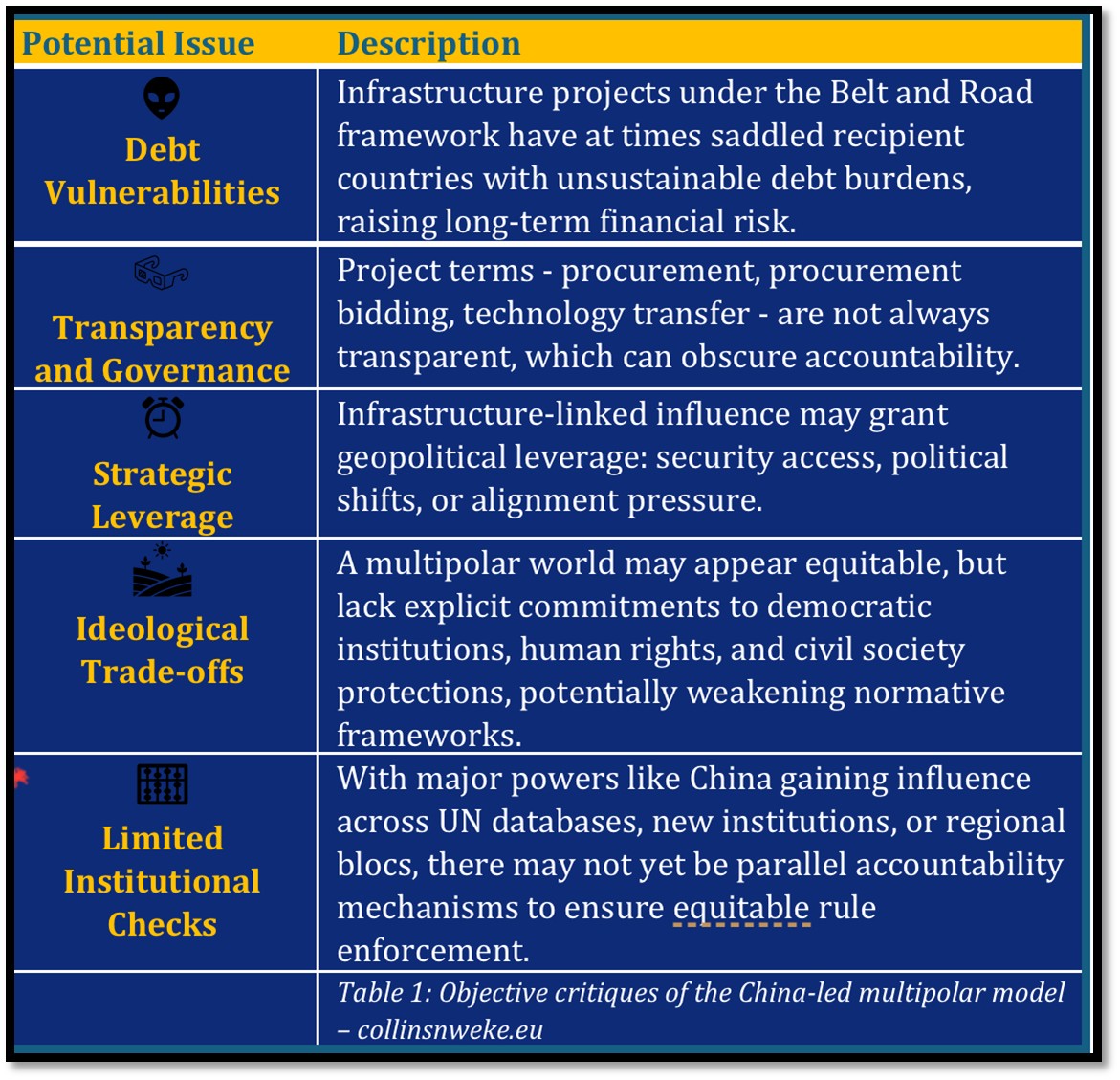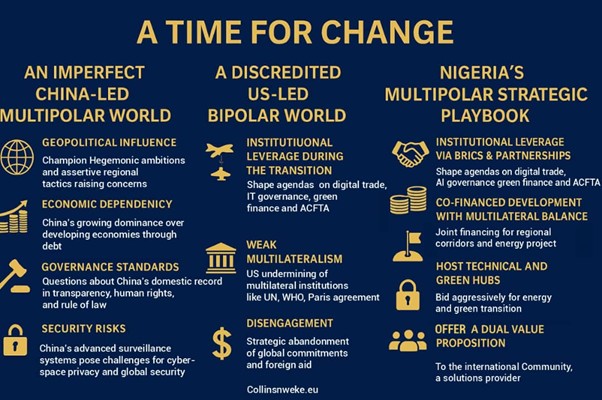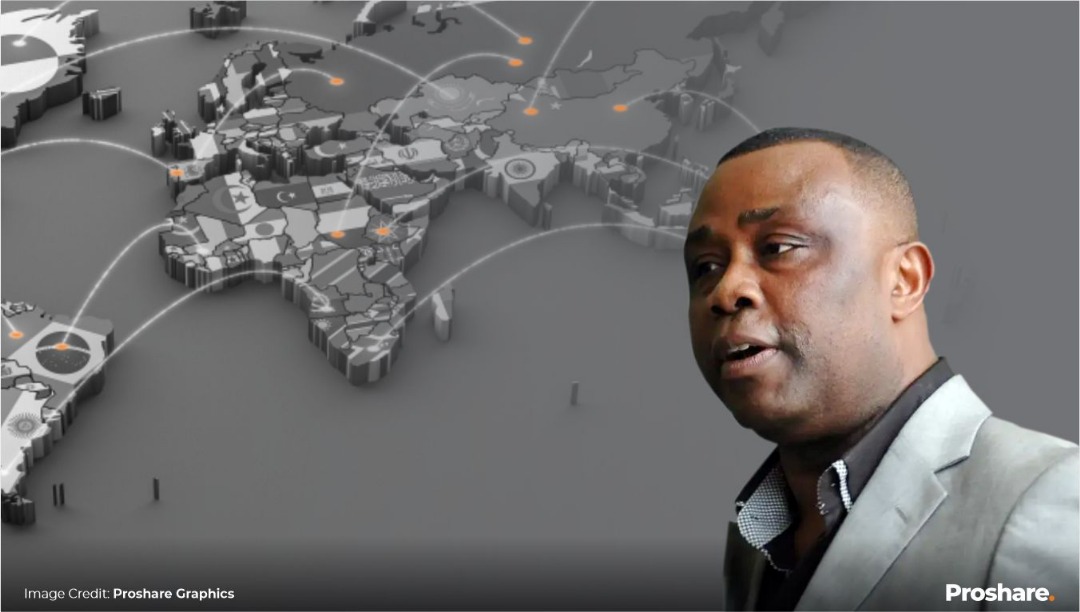The international balance of power is shifting. And the world finds itself at a crossroads between a familiar bipolar order. The United States, the current dominant player and its allies are on one side. On the other side is the murmur of a new, multipolar world led by China. Its tool is the Global Governance Initiative (GGI). This is neither utopian nor dystopian. We may call it the contours of what may shape global governance in the decades ahead. China’s global ambitions are not hidden incidents even as it alleges that the emerging multipolar arrangement has been occasioned by the ills of bipolarism.
The Ills of the Bipolar Paradigm
For much of the post–Cold War era, the United States has helmed a “Westphalian” or liberal international order rooted in alliances, liberal norms, free markets, interventionism, and a cluster of institutions like NATO, WTO, and the IMF. Yet this model has shown profound limitations:
- Selective rule-setting and double standards, where powerful states dictate rules without unanimity.
- Overextension leading to disengagement, as seen during the Trump administration’s withdrawals from the TPP, Paris Agreement, and attempts to exit WHO. These moves undermined U.S. legitimacy and coherence in global governance.
- Polarising alliances, which can sideline non-aligned or Global-South interests in critical decisions on trade, health, or climate.
These structural flaws have eroded trust and exposed governance vacuums; spaces in which others may fill the void.
The China Multipolar Vision: What is on the Table?
President Xi’s speech launching the Global Governance Initiative offers a sharply contrasting vision:
Core principles: sovereign equality; uniform application of international law (eschewing “house-made rules”); reinforcement of the UN’s significant role; a people-centered focus aimed at reducing North–South disparities; and outcome-driven multilateralism to preempt weak or fractured governance.
Concrete instruments:
- A commitment to add 10 GW each of solar and wind power across SCO member countries in five years.
- A dedicated AI application cooperation centre.
- Open access to China’s BeiDou navigation system and invitations to collaborate on its International Lunar Research Station.
- People-centred programmes addressing heart disease, vision, cancer, along with educational and cultural exchanges.
In essence, China seeks to institutionalise South–South collaboration, build technical and green infrastructure, and offer non-security coupling with tangible outcomes. All of these under a UN-oriented regime.

Objective Critiques of the China-Led Multipolar Model
Even as Beijing’s proposal cushions the Global South with investment and platform access, several legitimate concerns must be weighed without bias:

These critiques do not negate the merits of a multipolar framework. They highlight the need for safeguards, transparency, and multilateral oversight.
The Promise of the Multipolar Pivot
China’s multipolar offer contains undeniable appeal:
- Broader inclusion: It resists elite rule-setting, elevates voices from the Global South, and seeks to legitimise the UN as the chief governance anchor.
- Development focus: It emphasises tangible deliverables: energy, AI, health, education; rather than geopolitics.
- Alternatives to de-risking: Rather than fragmenting global markets, it proposes inclusive exchange, digital and green cooperation, and technical integration for all.
If pursued wisely, this model could reshape global governance to be more pragmatic, development-oriented, and inclusive.
Nigeria’s Strategic Imperative During the Transition
As the contours of a multipolar world take shape, Nigeria — and by extension Africa — must resist the temptation to merely react to global shifts. Too often, policy frameworks are designed to catch up, to mimic established models, or to ensure we are “not left behind.” This mindset risks confining Nigeria to a perpetual consumer role in a world where value increasingly lies in production, innovation, and agenda-setting.
Instead, Nigeria must craft a distinctive proposition anchored on two simultaneous tracks:
1. Leveraging What Nigeria Has to Meet Emerging Global Needs
Nigeria’s vast factor endowments, from natural resources and demography to fintech leadership and cultural soft power, should form the basis of purpose-driven competitiveness:
- Energy & Green Transition: Nigeria can position itself as a renewable energy hub for West Africa, tying local solar and gas assets to global net-zero demands.
- Digital & Creative Economies: By aligning fintech, Nollywood, and digital services with global platforms, Nigeria can translate cultural and creative capital into exportable value.
- Diaspora Capital: Its Diaspora network of over 17 million citizens is a strategic soft-power asset. Not just for remittances, but for technology transfer, advocacy, and market access.
2. Positioning Beyond Mass Consumption
In a multipolar order, countries that remain primarily import-driven risk becoming peripheral players. Nigeria’s goal must be to transform consumption patterns into production capacity:
- Invest in Local Manufacturing: From pharmaceuticals to electric vehicle components, Nigeria must play in value-added segments of global supply chains.
- Reframe Africa’s Role: Instead of being seen merely as a market for finished goods, Nigeria should champion Africa as a production partner for the technologies and industries that will define the next century.
- Organisational Competitiveness: Governance, contract enforcement, and institutional coherence must match the scale of ambition. Without internal reforms, external leverage is diminished.
A Nigeria-Led African Multipolar Agenda
Nigeria has the demographic weight, cultural influence, and geopolitical reach to lead an African agenda that redefines its role in the multipolar world:
- Redefine Competitive Advantages: Champion Africa’s position not as a passive recipient of global flows but as an active contributor of resources, ideas, and innovation.
- Shape Regional Coalitions: Through AfCFTA and BRICS partnerships, Nigeria can coordinate African positions on AI standards, green finance, data governance, and energy markets.
- Offer a Dual Value Proposition: To citizens and Diaspora, Nigeria must signal opportunity, inclusion, and purpose; to the international community, it must project itself as a solutions provider, not just a market.
This is not a race to mimic the existing powers. It is an opportunity to rewrite Africa’s role and Nigeria’s place within it. To succeed, Nigeria must lead with intent, invest in its strengths, and position itself where the emerging global demand meets its unique capabilities.

Conclusion
The bipolar world, with its alliance-driven strictures and interventionist undertones, has long constrained the agency of Global South nations. China’s multipolar blueprint, if footing toward inclusivity and development, may offer an alternative—but not without risks.
For Nigeria, the challenge and opportunity are clear: craft a strategic playbook that blends agency, safeguards, and alignment with Africa’s developmental aims. In doing so, Nigeria can help ensure that the emerging order isn’t just multipolar in power, but fairer, stronger, and better governed.
Stay ahead with the latest updates!
Join The Podium Media on WhatsApp for real-time news alerts, breaking stories, and exclusive content delivered straight to your phone. Don’t miss a headline — subscribe now!
Chat with Us on WhatsApp







